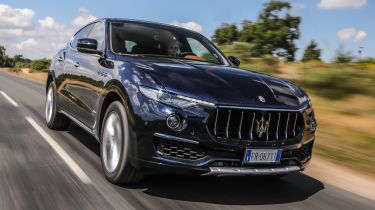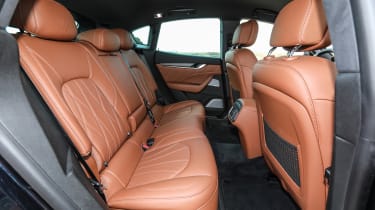Maserati Levante (2016-2025) review
The Maserati Levante SUV is competitively priced, and practical enough to open the brand up to a new group of buyers

This is a review of the 2016-2025 Maserati Levante. If you are interested in information about a used Maserati Levante, please follow the links provided.
Considering it has never built an SUV before, the Maserati Levante is a good first attempt from the Italian luxury car maker. It has all of the upmarket appeal that the company's saloons and sports cars have, while pricing is competitive within the luxury SUV sector to attract buyers.
Its chassis impresses and comfort is reasonable, although it's not quite a class-leader in either regard. Quality issues inside also mean it can’t compete with its German rivals, although it does offer good practicality. However, for some buyers the Maserati badge alone will be enough to tempt them into this stylish Italian machine.
Cars like the Maserati Levante are born of necessity. Makers offer them for sale because people like them, and they price them to sell well, so that they can reap the cash back to build other sportier models. Maserati was late to the SUV market, but the Levante has the interior quality and sporty appeal to make it an attractive model in the sector.
Prices start from around £60,000 and rise to almost £125,000 for the fastest V8-engined GTS and Trofeo models. That means the Levante is priced to compete against cars such as the Porsche Cayenne and Range Rover Sport, while in a middle ground between top-spec versions of the BMW X5, Audi Q7 and Alfa Romeo Stelvio. Other rivals could include hyper-luxury SUVs such as the Bentley Bentayga and Range Rover.
Used - available now

2024 Nissan
Ariya
12,471 milesAutomaticElectric
Cash £25,490
2021 Lexus
UX 300e
39,392 milesAutomaticElectric
Cash £16,950
2023 Hyundai
i30
23,040 milesManualPetrol1.0L
Cash £14,801
2021 Vauxhall
Mokka
16,283 milesAutomaticPetrol1.2L
Cash £15,795While the Levante has a traditional SUV shape, there are different configurations under the skin. The basic car is just called the Levante, while there's also the more potent Levante S. Both models are petrol-powered, four-wheel drive and feature an eight-speed automatic gearbox.
The standard Levante has a 3.0-litre V6 with 345bhp, while the Levante S bumps power up to 424bhp. Customers can opt for upgrade packs called GranLusso and GranSport - the GranLusso ramps up the luxury features, with plush leather trim and Ermenegildo Zegna silk in the cabin, as well as Radica open-pore wood trim.
Go for the GranSport model, and the Levante gets a racy makeover, with painted brake calipers 20-inch wheels and a more aggressive bodykit. Inside the cabin there is leather sports seats, along with stainless steel gear shift paddles and sport pedals. Both upgrade packs are priced the same, and add around £8,000 to the Levante's list price.
The most recent additions to the Levante range are the GTS and Trofeo models, both of which are fitted with a Ferrari-derived 3.8-litre V8 petrol engine. This engine produces 523bhp in the GTS and 572bhp in the Trofeo, with the latter achieving the title of the most-powerful series production Maserati ever. Rivals include the Porsche Cayenne Turbo and Audi SQ8. Both get Maserati’s Q4 four-wheel drive system, but with 100% of power going to the rear wheels in normal driving. Sportier styling helps set these models apart from the rest of the range, while the Trofeo also received a further styling update and additions to on-board tech in late 2020.
In spite of its size, the Levante is only a five-seater, although space in the back is pretty good. Unfortunately, while there's a mix of wonderful details inside, the Maserati is let down by poor quality switchgear buttons. There's a tech-filled touchscreen which was updated for the 2019 model year, but it’s still well behind the systems you’ll find in anything from Audi, BMW or Mercedes.
For some, the idea of a Maserati SUV is sacrilege, but as Porsche has demonstrated, it can be a nice little earner to help bankroll more interesting cars. For others, it’ll be an intriguing alternative to the clinical German norm.
Engines, performance and drive
When the Levante was launched, there was only one engine in the UK – a 3.0-litre turbodiesel – but the oil burner is no longer available, and there is now just V6 and V8 petrol power.
The V6 engine powers the base Levante and the Levante S version. On paper the S is slightly quicker than its closest rival, the Porsche Cayenne S. It’s an engine much better suited to the Levante than the diesel, and despite being more expensive to run, the wonderful soundtrack and strong performance make it worth the extra outlay.
The standard Levante V6 petrol engine joined the range in 2018. It’s slightly less powerful than the S, but it gets the same tuneful engine note and is cheaper to buy.
The Levante handles impressively for such a heavy, high-riding car, with a clear sporting intent and decent resistance to roll in Sport mode. In normal driving, 100% of the drive is sent to the back wheels, with power only sent to the front when slip is detected.
Any slip is kept in line through a system called Integrated Vehicle control. Introduced to the Levante range in 2018, it’s an ESP system that proactively adjusts itself against sliding, giving a near-seamless intervention - albeit one that drivers will rarely benefit from on public roads.
Leave it in the default mode, rather than Sport, letting the engine and gearbox do their thing, and the Levante becomes a competent cruiser, with a supple, refined ride. Wind and road noise isolation are respectable, if not quite a match for the Audi Q7.
Not many owners will take their Levante off road; and while the air suspension can be raised to improve ground clearance, it’s more impressive that, at speed, the car lowers itself to aid aerodynamics and efficiency.
Engines
The core of the Levante's engine range is made up of a twin-turbo, Ferrari-developed V6 engine that's also used in the Ghibli and Quattroporte saloons.
The 345bhp entry-level car still completes the 0-62mph dash in 6.0s flat, while the 424bhp S version takes this down to 5.2s and a 164mph maximum.
GTS and Trofeo models make up the hotter end of the spectrum – we’re yet to drive the former, but the latter is a full-blown Porsche Cayenne Turbo rival with 572bhp from its 3.8-litre petrol V8 that shares some lineage with that found in the Ferrari 488.
This engine dominates the driving experience and is a joy to use – a rumbling exhaust note, buckets of torque and connected to a smooth-shifting eight-speed automatic gearbox. The engine encourages hard driving and, thankfully, the car’s chassis can keep up – body roll is well controlled and there’s lots of grip and traction.
The GTS dispatches the 0-62mph sprint in a supercar-rivalling 4.3s, while the Trofeo is quicker still at 4.1s, with a 188mph top speed.
MPG, CO2 and running costs
A few years ago, the idea of a Maserati SUV would’ve sent shivers down the spine of Italian enthusiasts. But, the customer is king, and other equally sporty manufacturers have demonstrated that there is clear demand for crossing over to higher-riding, five-door family transport. It also helps with the balance sheet, too.
The diesel is no longer available, but is certainly the most affordable to run and could prove to be a sound used purchase, with official combined fuel economy of 31.0mpg. However, during an extensive week-long road test of the diesel model we achieved only 29.2mpg.
The petrol-powered models aren’t especially cheap to run: the entry-level V6 returns up to 22.6mpg on average with 269g/km of CO2. The GTS and Trofeo models are the least efficient, returning just 17.9mpg and 17.8mpg, respectively.
Insurance groups
Given the prestige badge and powerful engines, it's no surprise that the Levante sits in some of the highest insurance groups, so premiums will be high. Mind you, it's about on-par compared to its rivals.
Depreciation
Maserati is predicting strong residual values for its first SUV. Official data suggests it’ll hold on to more than 50% of its value after three years and 36,000 miles. That’s around the same as an entry-level Porsche Cayenne, though higher-spec (and more expensive) models, will lose more value over the same period of time.
Interior, design and technology
To get an accurate valuation on a specific model check out our free car valuation tool...
Practicality, comfort and boot space
While the Maserati Levante is a natural rival for the Porsche Cayenne on price and has bigger external dimensions, in terms of practicality it’s closer to the smaller Porsche Macan SUV.
The 580-litre boot is 90 litres down on the Cayenne’s, and thanks to the raised ride height you have to lift bags high to get them past the bumper. This is helped by the easy entry system that drops the suspension by 45mm to its lowest setting, but in reality few owners will take the time to use this feature on a regular basis.
Inside, despite the big centre console, storage is acceptable, with a tray in front of the gearlever, two cup-holders adjacent to it and a big, lidded storage area in between the front seats.
The driving position is excellent, thanks to a huge range of adjustment. This doesn’t just include the wheel and seats, but the pedal box, which electrically moves back and forth via a switch on the seat
Dimensions and size
Despite its coupe-like styling, the Levante is actually 18cm longer and 3cm wider than a Porsche Cayenne. With only five seats, it’s more comparable to the Porsche than something like an Audi Q7 – though in terms of sheer size, it’s not much smaller.
Legroom, headroom & passenger space
Space in the back of the Maserati Levante is generous, and there’s plenty of room for two adults – with generous head and legroom. Sitting three abreast might be a bit of a squeeze, but it’s certainly possible for shorter journeys. There’s no seven-seat version, meaning rivals like the BMW X5 and Audi Q7 have the edge when it comes to outright passenger space.
Boot space
The Levante’s boot is a decent size, but is more comparable with cars like the BMW X3, than the larger X5. The 580-litre load bay is 70 litres smaller than the X5, and 190 litres shy of the cavernous Audi Q7.
The load lip is a little high, but no worse than it is in rival models, while the standard powered tailgate is a useful touch. The rear seats split-fold 60:40 to reveal a big (but undisclosed) load area, meaning the Levante could prove useful for the occasional trip to the tip.
Reliability and safety
Maserati has big sales ambitions for the Levante, with the SUV set to open the brand up to more customers. It's still a low-volume manufacturer in the UK though, so it didn’t feature in our most recent annual Driver Power owner satisfaction survey. Build quality is good in some places but patchy in others, and overall it’s some way off rivals from Porsche or Audi.
The car should be safe, though. Euro NCAP hasn’t crash tested it, but the Ghibli, a car with which it shares much of its mechanical architecture, was awarded the maximum five-star rating when it was tested in 2013. The Levante gets six airbags as standard, and each of the outer rear seats is equipped with Isofix child seat mountings.
For an extra £2,300, the Driver Assistance Pack Plus adds a range of safety features, including a surround view camera, forward collision warning with autonomous emergency braking, blind spot warning, traffic sign recognition, and ‘Highway Assist’. Highway Assist mixes adaptive cruise control with lane keeping assist, which enables the Levante to drive autonomously on dual carriageways and motorways for short periods.
LED Matrix headlights were introduced in the 2018 updates, giving drivers a significantly better view of the road ahead at night, without dazzling oncoming traffic.
Warranty
The Maserati Levante’s three-year, unlimited mileage warranty is competitive, and beats the Audi Q7’s three-year/60,000-mile guarantee. Porsche, BMW and Mercedes all offer the same cover – and, according to historical data, are likely to suffer fewer niggles during the first few years.
Servicing
Maserati offers fixed-price servicing from £599, as well as three-year servicing packages from around £1,500. Service intervals of 12 months or 12,500 miles mean you’ll be visiting your dealer fairly regularly, though at the time of writing there are just 16 dealers spread across the length and breadth of the UK – meaning getting your car there might prove troublesome. However, as most Maserati dealers are joint franchises with Ferrari workshops, it'll feel like an event every time you take your car in for work.




